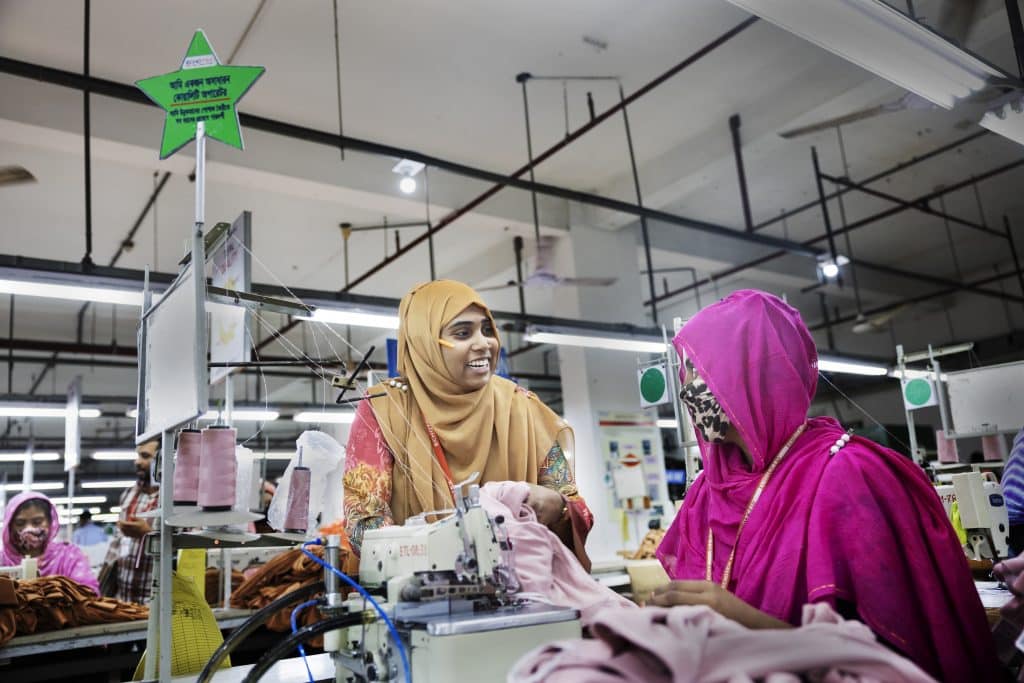Dhaka, Bangladesh, 10 December 2023– In the Industrial Gazipur district of Bangladesh, amid the steady hum of garment factories, lives Shalimar Akhter (25), a woman whose life reflects resilience in the face of challenges.
Today, Shalimar manages over 40 people in a local garment factory as a supervisor, guiding production and quality as a result of the Gender Equality and Returns (GEAR) programme. The initiative was designed by the International Finance Corporation (IFC) and is delivered as a joint initiative of the IFC and the International Labour Organization (ILO), as part of Better Work’s training and advisory services.
GEAR enhances soft skills and technical expertise to promote career progression for women in Better Work partner factories, facilitating their advancement into supervisory roles. Shalimar, along with nine other female colleagues, was selected as a potential leader, set to climb the career ladder across the factory floor. However, this achievement is the culmination of years spent navigating financial challenges and gender discrimination during various roles in local garment factories, including experiences of gender harassment.
Shalimar’s story shows the success achievable when crucial investment in prevention strategies is available. Her testimony also aligns with this year’s campaign theme: “Invest in women: Accelerate progress”.
“When you invest in women, you invest in a future where violence is not an accepted norm,” Shalimar said.
When you invest in women, you invest in a future where violence is not an accepted norm
Shalimar was born into a very modest family in the Gaibandha district in northern Bangladesh. The untimely death of her mother added further hurdles to the challenges she faced. However, instead of allowing the circumstances to define her, Shalimar took control of her destiny.
“I had to grow up quickly, with my mother gone and poverty at the doorstep. Education was my escape, my dream,” she said.
Against the tide of familial disapproval, she married the man of her choice, relocating together to the capital Dhaka. But the city’s embrace was cold; jobs were scarce, and the couple struggled. Shalimar’s determination saw her through; securing a job as a factory helper with a salary of BDT 5,700 (around 52USD) was a start but barely kept them afloat.
The shadows of gender discrimination and violence marred her journey at the first garment factory she worked in. “They doubted my abilities because I am a woman, tried to hinder my growth, and even compromised my pay due to gender biases.” Shalimar said.
But things changed when Shalimar joined EchoTex Ltd. in Gazipur, a Better Work partner factory where zero tolerance for gender-based violence and a committee for anti-harassment are firmly in place. Here, Shalimar started her journey with GEAR. After two months of intensive training, she emerged ready to embrace a managerial role. “GEAR didn’t just teach me skills; it taught me my value,” she said.

“Investing in women and girls via strategic policies and training is critical to a positive factory atmosphere, improved production, and enhanced business competitiveness,” said Shafayet Karim Chowdhury, EchoTex Ltd.’s HR Director. “Our company prioritizes a workplace free from gender-based violence and credits the GEAR programme for significantly contributing to this through its comprehensive training initiatives.”
Shalimar’s story also amplifies the voices of women in Bangladesh’s Ready-Made Garment (RMG) sector, confronting challenges that encompass both gender inequality, gender violence and economic hardship.
“The RMG sector, employing over 4.2 million people, is a key economic pillar, contributing over ten percent to the GDP,” said Mohamad Anis Agung Nugroho, Better Work Bangladesh Programme Manager. “We see the GEAR as a great investment for advocating gender equality, increasing productivity, and empowering women to embrace leadership roles.”
Equipped with training from GEAR and backed by factory support, Shalimar transformed her past industry experiences into activism, becoming a champion against gender-based discrimination and harassment. “Today, I stand not as a victim but as a symbol of defiance against these issues,” she said.
Research from Oxford University highlights GEAR’s positive influence on factory competitiveness, demonstrating that, on average, the programme led to a five percent boost in line efficiency. Also, a notable five percent rise in the proportion of women in management-level leadership roles was recorded, with female supervisors achieving an average wage increase of about 40 percent. From 2016 to 2023, GEAR trained some 800 female workers and supported the promotion of over 500 women to supervisory positions across some hundred factories.